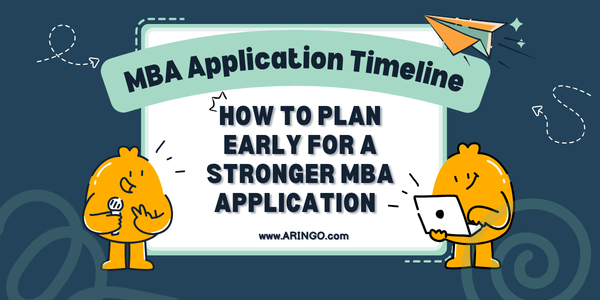Embarking on the MBA application process is a significant step toward transforming your career. For many, the acronym “MBA” represents a gateway to new opportunities, enhanced leadership skills, and a powerful global network. But with so many options available, from different program types to various continents, where do you even begin? Let ARINGO help you make informed decisions and build a strong foundation for your application.
MBA vs. Other Master’s Degrees: What’s the Difference?
Before diving into the world of MBAs, it’s crucial to understand why it might be the right choice for you over other master’s degrees, such as an MSc or an MPA.
- Master’s Degrees (MSc, etc.): These programs typically focus on a specific, specialized field of study, such as finance or data analytics. They are ideal for individuals who want to become subject-matter experts and advance within their current professional area.
- Master of Business Administration (MBA): An MBA is a comprehensive, holistic program that provides a broad range of business knowledge, covering everything from finance and marketing to operations and strategy. It is designed for those with significant professional experience (typically 3+ years) who are looking to advance into leadership roles, transition to a new industry, or launch their own entrepreneurial ventures. The learning is hands-on, often involving case studies and group projects.
Why Pursue an MBA? Defining Your Motivation
Applicants to top business schools generally fall into three main categories, each with a distinct motivation for pursuing an MBA:
- Switchers: These are individuals looking to change their career path, whether it’s a move to a new industry, a different function, or a shift in geography. An MBA provides the academic foundation and network to make a successful pivot.
- Accelerators: For those already on a successful career trajectory, an MBA can act as a catalyst. It provides the advanced knowledge and credentials needed to accelerate their climb to senior leadership positions.
- Future Entrepreneurs: The MBA environment offers a perfect incubator for aspiring founders. It provides the essential business skills, a network of future partners and investors, and a structured environment to develop a business plan.
Choosing the Right MBA Program: Think beyond rankings
Selecting the right program is the most critical step in your application journey. It’s not just about a school’s ranking but about finding the best fit for your personal and professional goals.
- Location: Your choice of location will define your professional network, cultural experience, and job opportunities post-graduation. Consider where you want to work and live after the MBA.
- USA vs. European Programs: US MBA programs are typically two years long and attract a higher percentage of American students. European programs are often shorter (1-1.5 years) and tend to have a more international student body, offering a quicker return on investment (ROI).
- Program Specialties: Look for schools with strong programs in the industries or functions you are targeting. Research the specific courses, faculty, and recruiting companies to see if they align with your career goals.
- Culture and Class Size: The learning environment is crucial. Some schools have a small, intimate class size and a collaborative culture, while others are larger and more competitive. This can significantly impact your learning experience.
Costs and Financial Aid
An MBA is a significant financial investment, with US tuition often ranging from $130K to $145K in total and European tuition between €80K to €100K for the full degree. However, various options can help you fund your education:
- Loans: Many students finance their MBA through a combination of federal and private loans.
- Scholarships: Merit-based scholarships and financial need-based aid are available directly from schools.
- External Scholarships: Numerous organizations and foundations offer scholarships and fellowships (e.g., Chevening, Fulbright) that are not tied to a specific school.
The Road to a Successful Application
The application process is intensive and requires careful planning. Most candidates apply to 4-7 schools, aiming for a mix of “Reach,” “Target,” and “Safety” schools. It is advisable to begin preparing your applications 3-5 months in advance of the deadline.
Remember to avoid common pitfalls like writing a poor application or applying with a GMAT score significantly below the school’s average. For more in-depth advice on crafting a standout MBA application, contact us today for a free profile evaluation.
Watch this info session by our CEO, Jen Turtschanow before starting with your MBA application:





